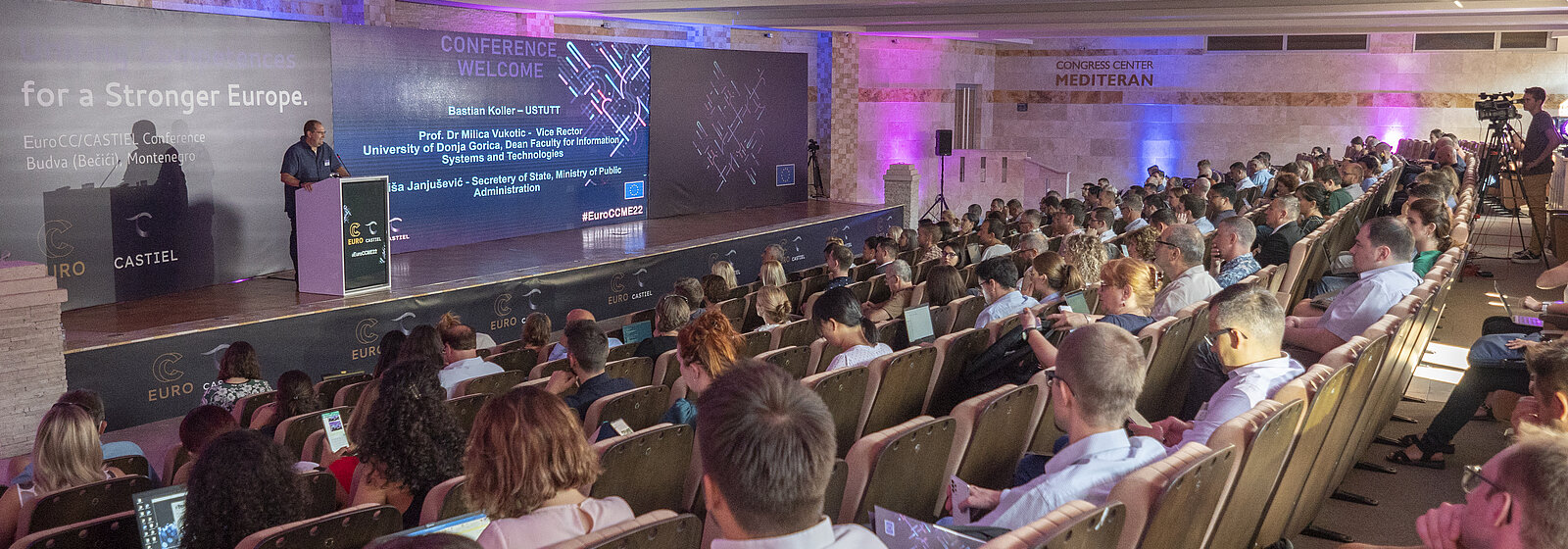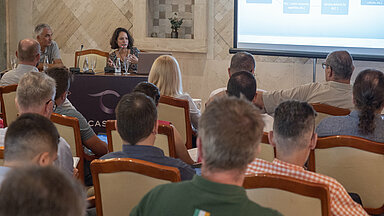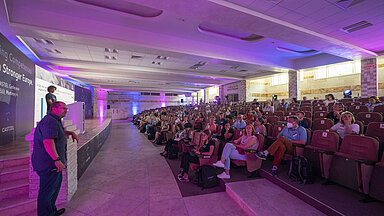September 22, 2022 - by Santina Russo
“Uniting Competences for a stronger Europe” was its motto: On September 6 – 9, the international EuroCC/CASTIEL conference within the framework of the EuroCC project brought together experts from the National Competence Centres (NCCs) in high-performance computing (HPC) all over Europe in beautiful Bečići, Montenegro. Over 200 experts from 33 different countries attended the conference.
Overall, the program covered topics from the field of HPC technologies and related disciplines such as high-performance data analysis (HPDA), artificial intelligence (AI), or parallel programming. Amongst else, the conference featured presentations of highlights from various NCCs, a panel discussion on HPC+ best practices in academia and public administration, presentations of project success stories that include the use of HPC, artificial intelligence and cloud technologies, as well as meet and greet sessions.
NCCs as hubs for collaboration and knowledge
In particular, one of the panel discussions covered the importance of the NCCs for a strong European HPC ecosystem and their role as hubs for collaboration: for bridging the gap between IT and HPC, for connecting expertise, benefitting from synergies, and advancing HPC training. Also addressed was a topic that will be crucial for the future: sustainability in HPC.
In addition, two sessions were devoted to HPC+ in industry, especially SMEs— a parallel track and a presentation of success stories of the FF4EUROHPC project. FF4EUROHPC aims to boost the innovation potential and competitiveness of SMEs by facilitating their access to advanced HPC-related technologies and expertise. As presented at the conference, national initiatives within this program have successfully supported SMEs in understanding the return of investment of adopting HPC technologies as well as helped several first time SME HPC users to obtain funding for their proof of concept and to test new technologies.
In Switzerland, CSCS has been integral in the task to create and shape a NCC Switzerland. One of CSCS’ activities related to the EuroCC project is the promotion of in-house developed software products like Sarus and FirecREST. Sarus is a container engine that provides a user-friendly way to use feature-rich software containers from Docker images on HPC systems with their unique requirements and benefits. As such, it brings together the portability of containers and the performance of supercomputers.
FirecREST serves as gateway and interface for managing HPC resources for web applications and with this provides an easy way to integrate access to HPC systems into web-based workflows — a rising need for many scientific communities. Both of these software products are already in use at CSCS and are now, within EuroCC, in the process of being disseminated and made available to other HPC facilities and their users in Europe.
For those who missed the conference or would like to check up on single sessions, the videos from the live stream are available on the conference website.
More information:
- About EuroCC: The EuroCC project brings together the necessary expertise to set up a network of National Competence Centres (NCCs) in HPC across Europe with over 30 participating members and associated states, to provide a broad service portfolio tailored to the respective national needs of industry, academia and public administrations. The goal is to support and strongly increase the national strengths of High Performance Computing (HPC) competences as well as High Performance Data Analytics (HPDA) and Artificial Intelligence (AI) capabilities and to close existing gaps, to increase usability of these technologies in the different states and thus provide a European excellence baseline.
- About the NCCs: EuroCC aims to build a European network of 33 National Competence Centres (NCC) in HPC to bridge the existing HPC skills and knowledge gaps while promoting cooperation across Europe. Each participating country is tasked with establishing a single National Competence Centre in the area of HPC, which will coordinate activities in all HPC-related fields at the national level and serve as a contact point for customers from industry and science, for current and future HPC experts, and the general public alike.



